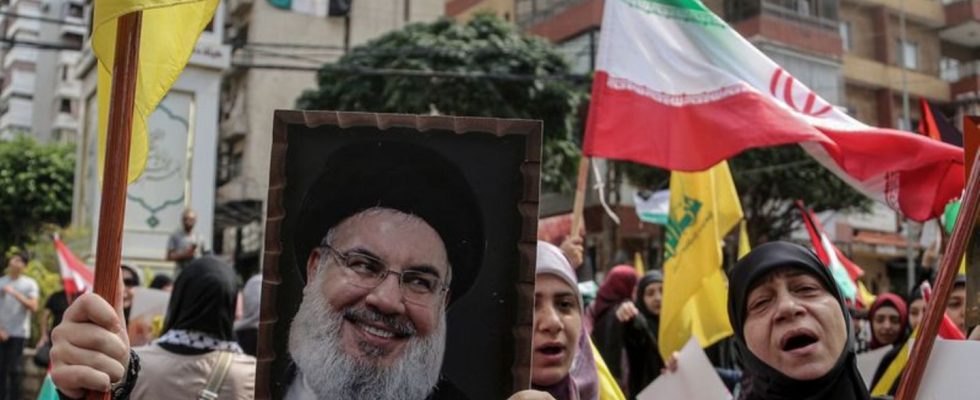Lebanon watched the speech by Hezbollah leader Hassan Nasrallah with excitement but also fear. For the first time since the Gaza war broke out, he broke his silence.
With Hezbollah and Palestine flags waving, thousands of supporters of the Shiite organization march through the suburbs of the Lebanese capital Beirut. They have been waiting for a month for Hezbollah leader Hassan Nasrallah to appear. The day has now come on Friday. Nasrallah speaks publicly to his supporters for the first time since the Gaza war broke out. “God bless Nasrallah,” they shouted from where the Secretary General’s message was broadcast.
Fans of the Shiite leader immediately composed their own song. It calls for an attack on the Israeli coastal metropolis of Tel Aviv. In order to attract guests to their restaurants’ televisions, falafel sandwiches were offered at a ridiculous price. “We need Nasrallah’s appearance to get things moving,” said one of his supporters before the speech.
But not everyone is cheering. The Lebanese’s fear of another war with Israel runs deep. “We cannot endure another war,” says Fatima, a Lebanese woman who prefers not to have her last name published. She lives in southern Beirut, the part of Lebanon’s capital that is controlled by the Shiite organization Hezbollah. “I really don’t want to be evicted and lose everything like I did in 2006,” she said before the speech.
Concern is growing
2006 is the key word that can often be heard as a warning reminder in the streets of Beirut these days. 2006 was the year in which more than 1,500 civilians were killed in fierce fighting between Hezbollah and the Israeli military – a majority of them in Lebanon.
Since the Gaza war broke out, concerns have grown every day that the conflict could spread to the cedar state. Hezbollah, which controls, among other things, the south of the country and thus also the border with Israel, sees itself on the side of the “Palestinian resistance”. Since October 7th there have been almost daily battles with the Israeli army at the border. There were fatalities on both sides, the majority of whom were Hezbollah fighters.
Nasrallah warns of escalation
Despite all his fears, the Shiite leader ultimately decided against declaring war on Israel. There is no need for it, as the Shiite militia has already joined the fight in the Israeli-Lebanese border area. There was also no shortage of other threats: “All options are on the table,” said Nasrallah. “All possibilities on our Lebanese fronts are within reach.” His supporters cheer and clap. Some even shed tears of joy.
According to Nasrallah, an escalation depends on the course of the war in the Gaza Strip and on Israel’s behavior towards Lebanon. It is a “realistic possibility” that the “Lebanese front will turn into a major battle.” “Some may perceive what is happening on our front as moderate, but we will not be satisfied with that,” Nasrallah said.
As part of the Iranian-led “Axis of Resistance,” Hezbollah listens primarily to the words from Tehran. Iran’s leadership had repeatedly threatened the Jewish state in the weeks since the Gaza war began. This is a line that Hezbollah also follows.
Hezbollah has tens of thousands of followers with whom it controls primarily the south on the border with Israel, Shiite-inhabited districts of Beirut and the Bekaa Valley in the north of the country. At the same time, Hezbollah is considered a strong political power in Lebanon, which is on the verge of collapse.
“Nasrallah can speak for himself and his supporters and not for all Lebanese,” says Mohammed, a 30-year-old bank employee in Beirut. “If he wants to declare war, he can come out of hiding to fight with his fighters against Israel instead of using all Lebanese as shields.” Where the Hezbollah leader lives is unknown. He also addressed his followers via video message on Friday. He last appeared at a public event in November 2014.
Young Lebanese want to have fun one last time
Lebanon is anything but capable of waging war. There is currently a lack of almost everything: a head of state, a government, a stable currency. Since the end of 2019, the Mediterranean state has been in the worst economic and financial crisis in its history. The country is running out of foreign currency. The Lebanese currency has lost a lot of value. The crisis is also attributed to decades of corruption in politics and business.
For over a year now, the election of a president has repeatedly failed due to power struggles within the political elite. The country is currently led by Prime Minister Najib Mikati. The government is only able to act to a limited extent. Added to this is the civil war in neighboring Syria. According to UNHCR, more than 1.5 million Syrian refugees live in Lebanon. It is estimated that around a quarter of the population of more than five million people are Syrian refugees.
Lebanese across the country therefore fear that further escalation between Hezbollah and Israel could mean the end of Lebanon. “We are all still suffering from the massive explosion at Beirut port in 2020,” says 45-year-old Georgette. “We’re sitting on packed suitcases,” she adds. Many Lebanese have rented houses in the mountains – outside the big cities – so that they can flee if war breaks out.
“Have fun one last time” was the motto of young Lebanese on the eve of the speech. “We don’t know what’s going to happen tomorrow, so we’re all going out together again today,” said 26-year-old Haydar Dagher. He and his friends had arranged to meet at the amusement park: “Who knows what will happen after Friday.” The feared declaration of war, which could have suddenly changed the lives of the Lebanese, failed to materialize.

